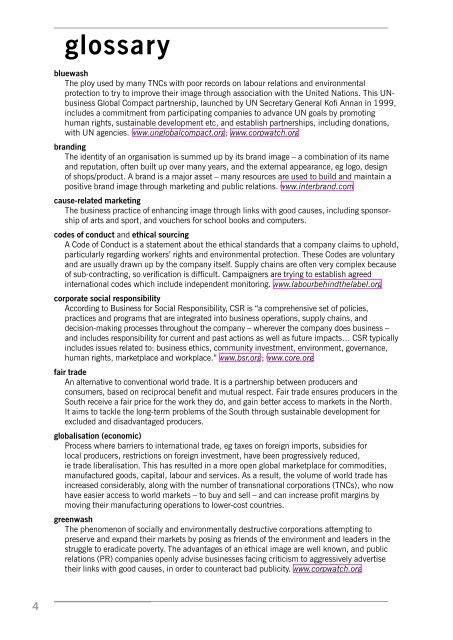Cost of coffee.indd - RISC
Cost of coffee.indd - RISC
Cost of coffee.indd - RISC
You also want an ePaper? Increase the reach of your titles
YUMPU automatically turns print PDFs into web optimized ePapers that Google loves.
glossary<br />
bluewash<br />
The ploy used by many TNCs with poor records on labour relations and environmental<br />
protection to try to improve their image through association with the United Nations. This UNbusiness<br />
Global Compact partnership, launched by UN Secretary General K<strong>of</strong>i Annan in 1999,<br />
includes a commitment from participating companies to advance UN goals by promoting<br />
human rights, sustainable development etc, and establish partnerships, including donations,<br />
with UN agencies. www.unglobalcompact.org; www.corpwatch.org<br />
branding<br />
The identity <strong>of</strong> an organisation is summed up by its brand image – a combination <strong>of</strong> its name<br />
and reputation, <strong>of</strong>ten built up over many years, and the external appearance, eg logo, design<br />
<strong>of</strong> shops/product. A brand is a major asset – many resources are used to build and maintain a<br />
positive brand image through marketing and public relations. www.interbrand.com<br />
cause-related marketing<br />
The business practice <strong>of</strong> enhancing image through links with good causes, including sponsorship<br />
<strong>of</strong> arts and sport, and vouchers for school books and computers.<br />
codes <strong>of</strong> conduct and ethical sourcing<br />
A Code <strong>of</strong> Conduct is a statement about the ethical standards that a company claims to uphold,<br />
particularly regarding workers’ rights and environmental protection. These Codes are voluntary<br />
and are usually drawn up by the company itself. Supply chains are <strong>of</strong>ten very complex because<br />
<strong>of</strong> sub-contracting, so verification is difficult. Campaigners are trying to establish agreed<br />
international codes which include independent monitoring. www.labourbehindthelabel.org<br />
corporate social responsibility<br />
According to Business for Social Responsibility, CSR is “a comprehensive set <strong>of</strong> policies,<br />
practices and programs that are integrated into business operations, supply chains, and<br />
decision-making processes throughout the company – wherever the company does business –<br />
and includes responsibility for current and past actions as well as future impacts… CSR typically<br />
includes issues related to: business ethics, community investment, environment, governance,<br />
human rights, marketplace and workplace.” www.bsr.org; www.core.org<br />
fair trade<br />
An alternative to conventional world trade. It is a partnership between producers and<br />
consumers, based on reciprocal benefit and mutual respect. Fair trade ensures producers in the<br />
South receive a fair price for the work they do, and gain better access to markets in the North.<br />
It aims to tackle the long-term problems <strong>of</strong> the South through sustainable development for<br />
excluded and disadvantaged producers.<br />
globalisation (economic)<br />
Process where barriers to international trade, eg taxes on foreign imports, subsidies for<br />
local producers, restrictions on foreign investment, have been progressively reduced,<br />
ie trade liberalisation. This has resulted in a more open global marketplace for commodities,<br />
manufactured goods, capital, labour and services. As a result, the volume <strong>of</strong> world trade has<br />
increased considerably, along with the number <strong>of</strong> transnational corporations (TNCs), who now<br />
have easier access to world markets – to buy and sell – and can increase pr<strong>of</strong>it margins by<br />
moving their manufacturing operations to lower-cost countries.<br />
greenwash<br />
The phenomenon <strong>of</strong> socially and environmentally destructive corporations attempting to<br />
preserve and expand their markets by posing as friends <strong>of</strong> the environment and leaders in the<br />
struggle to eradicate poverty. The advantages <strong>of</strong> an ethical image are well known, and public<br />
relations (PR) companies openly advise businesses facing criticism to aggressively advertise<br />
their links with good causes, in order to counteract bad publicity. www.corpwatch.org<br />
4




